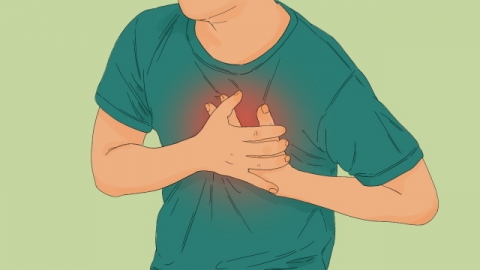What causes chest pain?
Generally, chest pain may be caused by emotional tension and anxiety, excessive fatigue, costochondritis, gastroesophageal reflux disease (GERD), or angina pectoris due to coronary heart disease. It is recommended to seek timely medical consultation to determine the exact cause, followed by symptomatic treatment under a physician's guidance. A detailed explanation is as follows:

1. Emotional tension and anxiety: Prolonged mental stress and anxiety can lead to autonomic nervous system dysfunction, causing chest tightness and stabbing pain, often related to emotional fluctuations. Symptoms can be relieved by deep breathing, meditation, and listening to calming music. Avoid long-term exposure to high-pressure situations, seek psychological counseling when necessary, and adjust your mental state to alleviate pain.
2. Excessive fatigue and strain: Long-term heavy physical labor or strenuous exercise can strain the chest wall muscles and fascia, causing chest soreness, which can be relieved by rest. Reduce physical exertion, avoid overexertion, rest in bed when experiencing pain, apply local heat therapy to promote blood circulation, and consider appropriate massage to relax strained muscles.
3. Costochondritis: Inflammation of the costal cartilage caused by trauma or infection results in localized chest pain that worsens with pressure. Patients should follow medical advice to use medications such as ibuprofen sustained-release capsules, diclofenac sodium enteric-coated tablets, or celecoxib capsules to relieve pain.
4. Gastroesophageal reflux disease (GERD): Reflux of stomach contents irritates the esophageal mucosa, causing a burning sensation behind the breastbone and chest pain, often accompanied by acid regurgitation and belching. Patients should follow medical advice to use medications such as omeprazole enteric-coated capsules, rabeprazole sodium enteric-coated tablets, or domperidone tablets to suppress gastric acid secretion and promote gastric motility.
5. Coronary heart disease with angina pectoris: Insufficient blood supply in the coronary arteries leads to transient myocardial ischemia and hypoxia, causing oppressive chest pain, possibly accompanied by chest tightness and sweating. Patients should rest immediately and follow medical advice to use medications such as nitroglycerin tablets, aspirin enteric-coated tablets, or clopidogrel bisulfate tablets to dilate blood vessels and prevent blood clots.
In daily life, maintain a regular routine, avoid staying up late and excessive fatigue, eat a light diet, and reduce the intake of high-fat and high-salt foods. Engage in moderate exercise, such as walking or jogging, to enhance cardiopulmonary function. Learn to regulate emotions and avoid intense emotional fluctuations to reduce the risk factors for chest pain.








